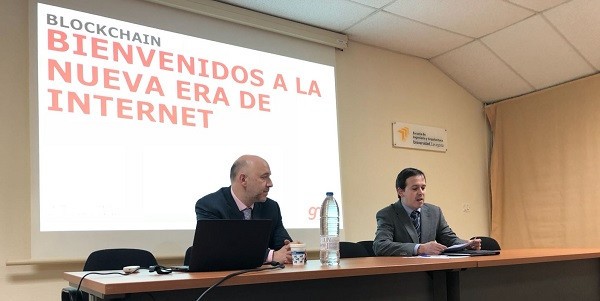Blockchain, a new digital era based on decentralization and trustworthiness

Internet is a mighty communication and information-transformation tool, but up to now it has not catered for value exchanges: money, house ownership, electric power... Not without a go-between, a third party both parties trust. Business models like YouTube, Amazon, Airbnb, Facebook, Spotify, etc. base their success on serving as a central point of contact between various actors, building up customer trust. At the same time, however they are hoist by their own petard.
What would happen if persons, firms or even machines could intercommunicate, setting up networks where trust is guaranteed and distributed, not centralized on one of the actors in the relation? What would happen if we were also able to carry out transactions anonymously without revealing our identity? Welcome to Blockchain, a world that still begs many questions even while it opens up new expectations and opportunities. A technology that could change absolutely everything. In short, a new digital era: that of the Internet of value and trustworthiness.
Virtual Currency
In 2008 an author (or authors) hiding behind the pseudonym of Satoshi Nakamoto created Bitcoin, the first electronic currency meeting all the abovementioned requisites: decentralized, anonymous, secure and inviolable. The Bitcoin-enabling technology is called Blockchain. But Blockchain also transcends Bitcoin.
The irruption of the so-called intelligent contracts and, based on them, the decentralized autonomous organizations (like the DAO) are bound to revolutionize practically all sectors, as well as our way of understanding organization, democratic participation and employment. The freedom from any central relation-supervising authority sets up a level playing field between individuals or between any individual and administrative structures. There will also be more powerful tools for defining relations with other organizations, offering many advantages but also imposing more responsibilities, which have to be managed more freely and mindfully.
What is Blockchain and how does it work? What are its basic principles? Its pros and cons? Which factors are likely to determine Blockchain’s success or failure? How does it link up with other artificial-intelligence or IoT trends? Which applications are foreseen? Are said applications secure? How can they be protected from cybercrime? What conflicts might be set up between these applications and data privacy or regulations like GDPR?
Without a shadow of a doubt, there is a host of pending questions and trilling challenges that need to be tackled and analyzed. For example, how will cybersecurity work in this new business “space”? What about the enlightened cheats on the lookout for the least flaw in the intelligent-contract programs to fill their own pockets? The latest known cyberheist was perpetrated on CoinCheck, Japan’s second biggest exchange house, which suffered the world’s worst cryptocurrency heist to date: 530 million New Economy Movement (NEM) dollars, which were siphoned off into the pockets of unknown hackers.
Ángel Gavín, GMV’s specialist in disruptive technologies, gave a lecture on this particular disruptive technology, which looks set to become a transcendental change in the future. During the conference organized by the SAMCA Technology Development Chair of Aragon (Cátedra SAMCA de Desarrollo Tecnológico de Aragón) (Universidad de Zaragoza), GMV’s expert analyzed all the abovementioned aspects and explained how our society might change, as well as mentioning the main Blockchain-based applications, today and tomorrow, in sectors like banking, insurance, healthcare, energy, transport and industry.
José Ángel Castellanos (Director of the Engineering and Architecture School of the Universidad de Zaragoza), Ángel Gavín (GMV Business Development Manager), Nacho Garcés (Director of the Engineering Research Institute of Aragón, I3A), Javier Nogueras (Subdirector of the Engineering Research Institute of Aragón, I3A)